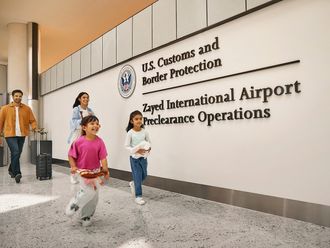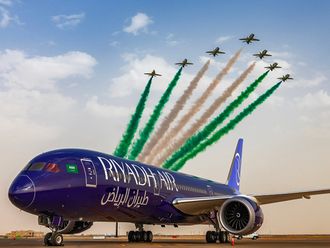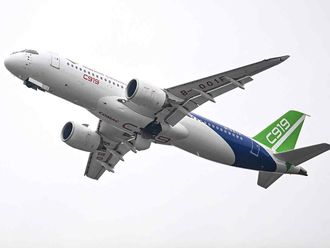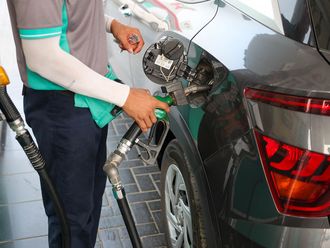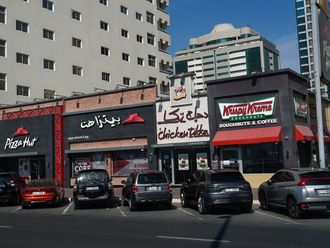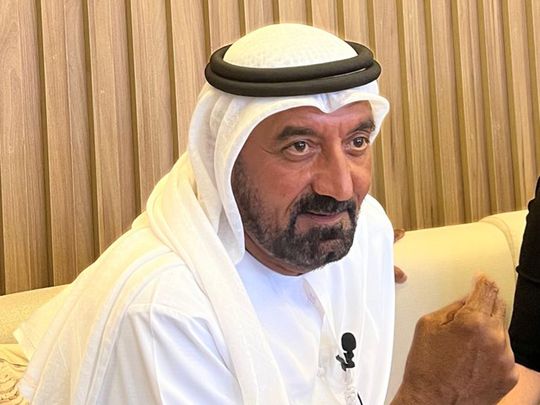
Dubai: The First Class seating configuration will remain very important for Emirates in the future, said Sheikh Ahmed bin Saeed Al Maktoum, Chairman and Chief Executive of Emirates Airline and Group, during a media briefing on the second day of Dubai Airshow 2023.
And this is despite the airline’s exceptional performance with the Premium Economy seats, an offering the airline launched in May last year.
“When it comes to our numbers on the (performance) of Premium Economy, what we have achieved so far is beyond our expectations. This is doing so well, and we will continue seeing it on different routes on the Emirates network as more aircraft are fitted with these seats,” he said. In October this year, Emirates debuted its Premium Economy services to Mumbai, India.
A new seat configuration?
While acknowledging the success of Premium Economy, Sheikh Ahmed confirmed the permanence of the First Class configuration with Emirates. He intriguingly hinted at introducing a ‘different’ seat offering in the near future. He told the media, “You will see something else delivered within the new aircraft of Emirates that would be coming in the future.” The airline Chairman did not disclose details and said, ‘it will be a surprise’.
Sheikh Ahmed also mentioned the flexibility of First Class configurations, saying, “We have to take the First Class configuration route by route; maybe on some routes, we may have a two-class configuration.” Sheikh Ahmed’s comments come when several other airlines are doing away with their First Class seats to maximize revenues.
Emirates and flydubai, on Monday, unveiled a staggering $63 billion procurement plan for widebody aircraft from Boeing, despite the delivery delays airlines have been facing for the 777Xs. When asked about his confidence in timely deliveries, Sheikh Ahmed said, “Is there another choice? What’s available in the market is the 777 and A350s, and that’s it. We hope someone else will come up with something different, but who will that be? Maybe the Brazilians (Embraer) or the Canadians (Bombardier). But these are all single-aisle aircraft,” asked Sheikh Ahmed.
Future of A380s
The world’s biggest operator of the Airbus A380 has been expanding its jumbo jet fleet by acquiring the aircraft from plane lessors as its lease expires. The French OEM stopped manufacturing the double-deckers in 2021. Sheikh Ahmed, however, said the airline would continue to expand its fleet with more A380s from lessors for ‘the right price.
“The A380 will stay with us until at least 2035. We will continue to buy it for the right price,” he added.
Stake in other airlines?
Dismissing speculations about potential stake acquisitions in other international carriers, including Sri Lankan, Sheikh Ahmed confirmed that Emirates has no such plans. He said, “We are focused on growing our business here and continuing to do that.” Additionally, he commended plane lessor DAE for its substantial acquisitions in recent years, noting that these moves have significantly expanded its fleet size to 500 aircraft.
Is IPO in the pipeline?
Commenting on when and if the Emirates Group would consider an initial public offering (IPO), Sheikh Ahmed said, “I think it is a good thing to see there would be ten companies in Dubai that would IPO and I think so far there have been five. But the decision on when Emirates (Group) would IPO is with the government (of Dubai.”
Any conflict pressure?
Commenting on whether the recent geopolitical tensions in the region have impacted Emirates’ operational traffic, Sheikh Ahmed said, “When it comes to the business, we see there is a ‘small’ impact, and we hope that it will not continue and they will be able to solve this issue,” he said. Sheikh Ahmed said he wouldn’t be able to pinpoint which part of the network has been impacted due to the ongoing conflict, as Emirates’ performance in the past six months has been exceptional. “And if you were to talk about an impact, it could also be because of the high oil prices and not just the geopolitical tensions,” he said.


